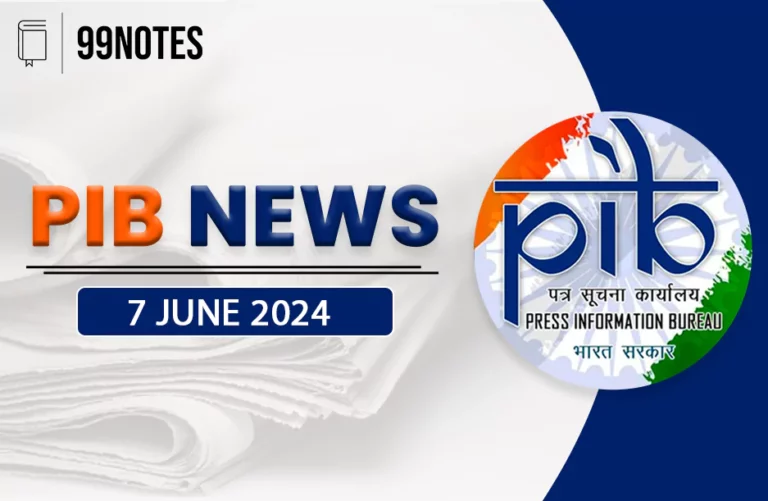11 May 2023 : PIB
Press Information Bureau
11-May-2023
Daily Current Affairs For UPSC ,The PIB ( Press Information Bureau )
1. 252 Lakh Metric Ton (MT) wheat procurement done so far.
Topic: GS3
Context:
- As of 9th May, 2023, wheat procurement during the Rabi Marketing Season (RMS) 2023-24 has reached nearly 252 Lac Metric Tons (MT).
Issue:
- Food Corporation of India and other State Agencies are involved in the smooth procurement operations across the country.
- Over 20 Lakh farmers have benefited from the ongoing wheat procurement, receiving more than Rs. 47,000 crores directly credited to their Bank Accounts at the Minimum Support Price (MSP).
- The major contributions to procurement come from Punjab (118.68 LMT), Haryana (62.18 LMT), and Madhya Pradesh (66.50 LMT).
Issues with food procurement programme in India:
- Distorted Market Prices: The procurement program, which guarantees a Minimum Support Price (MSP) for crops like wheat and rice, can distort market prices. This can create an imbalance between the prices offered by the government and the market demand and supply dynamics, impacting the overall agricultural economy.
- Inequitable Distribution: Despite efforts to reach farmers across the country, there are concerns about the equitable distribution of benefits. Small and marginalized farmers, who often lack access to government support and resources, may not receive the same level of benefit as larger farmers.
- Storage and Management: The procurement of large quantities of food grains presents challenges in terms of proper storage and management. Inadequate storage facilities can lead to spoilage, wastage, and the loss of government investment.
- Market Distortions for Other Crops: The focus on procuring wheat and rice can create market distortions for other crops. Farmers may be incentivised to prioritise these crops, leading to reduced diversification and potential imbalances in crop production.
- Administrative Efficiency: The efficiency of the procurement process can vary across different states and regions. Issues such as bureaucratic hurdles, delays in payments, and logistical challenges can hinder the smooth functioning of the program and impact farmers’ livelihoods.
- Environmental Impact: Intensive cultivation of crops like wheat and rice, supported by the procurement program, can have environmental implications. Excessive groundwater extraction, increased use of fertilizers and pesticides, and the loss of biodiversity are some of the concerns associated with this type of agriculture.
- Financial Burden: The financial burden of implementing the procurement program falls on the government, which may face challenges in managing the costs, especially during periods of surplus production.
Way forward:
- Market Reforms: Implement market-oriented reforms to reduce distortions and ensure a fair price mechanism. This can involve gradually reducing the reliance on government procurement and promoting competitive markets where farmers can directly engage with buyers.
- Diversification and Crop Planning: Encourage crop diversification by promoting the cultivation of a wide range of crops and providing support for alternative crops with market demand.
- Strengthening Storage Infrastructure: Invest in improving storage infrastructure, including modernising and expanding warehouses and cold storage facilities. This will help reduce post-harvest losses and ensure proper management of procured food grains.
- Technology Adoption: Harness technology solutions such as remote sensing, satellite imagery, and data analytics to improve crop forecasting, supply chain management, and monitoring of procurement operations. This can enhance efficiency, transparency, and accountability in the system.
- Targeted Outreach and Support: Focus on providing support and resources to small and marginalised farmers who often face challenges in accessing government schemes. This can include targeted financial assistance, training programs, and access to credit and market linkages.
- Streamlining Administrative Processes: Simplify administrative processes, reduce bureaucratic hurdles, and ensure timely payments to farmers. This can enhance the efficiency of the procurement program and improve farmers’ confidence and participation.
- Environmental Sustainability: Promote sustainable agricultural practices, such as organic farming, water conservation, and integrated pest management, to mitigate the environmental impact of intensive crop cultivation. This can help protect natural resources and foster long-term agricultural sustainability.
- Stakeholder Collaboration: Foster partnerships between the government, farmers, agricultural experts, industry stakeholders, and civil society organizations. Collaboration and dialogue can help identify challenges, develop effective solutions, and ensure the participation of all stakeholders in decision-making processes.
- Regular Evaluation and Monitoring: Establish a robust monitoring and evaluation framework to assess the effectiveness of the procurement program and identify areas for improvement. Regular review and feedback loops will help in making necessary adjustments and ensuring continuous progress.
2.Union Minister chairs the first Steering Committee Meeting of Deep Ocean Mission.
Topic: GS3.
What is Deep Ocean Mission:
- The Deep Ocean Mission is a multi-disciplinary initiative launched by the Government of India.
- The mission focuses on:
- Deep-sea research: It aims to explore the deep ocean up to a depth of 6,000 meters and conduct scientific studies on biodiversity, climate change, and mineral wealth.
- Development of deep-sea technologies: The mission intends to develop technologies for deep-sea mining, underwater robotics, and ocean climate change advisory services.
- sustainable use of ocean resources: Its aim is to explore and harness the vast resources and potential of the deep ocean for the benefit of the nation.
- The mission includes the development of a manned submersible capable of reaching a depth of 6,000 meters for scientific exploration and research purposes.
- It seeks to establish an advanced marine station for ocean biology research and develop infrastructure for sample collection, analysis, and preservation.
Benefits of Deep Ocean Mission
- It will promote deep-sea biodiversity conservation and environmental management strategies.
- The mission aims to enhance India’s scientific and technological capabilities in ocean exploration and contribute to global knowledge on the deep ocean.
- It aligns with the United Nations’ Sustainable Development Goal 14, which focuses on the conservation and sustainable use of oceans, seas, and marine resources.
- Union Health Ministry launches SAKSHAM Learning Management Information System
Topic: GS3.
- Issue:
- SAKSHAM (Stimulating Advanced Knowledge for Sustainable Health Management) is a Learning Management Information System (LMIS) launched by Shri Rajesh Bhushan, Union Health Secretary.
- The platform has been developed by the National Institute of Health & Family Welfare (NIHFW), New Delhi.
- SAKSHAM is a digital learning platform designed to provide online training and medical education to all health professionals in the country.
- It aims to ensure inclusive capacity building of health professionals, from primary health centres in rural and remote areas to tertiary care and corporate hospitals in metropolitan cities.
- The platform currently offers more than 200 public health and 100 clinical courses in an online mode.
- Upon completion of the courses and meeting the required assessment criteria, participants can obtain certification.
- SAKSHAM: LMIS serves as a dedicated and unified platform for enhancing the knowledge and skills of healthcare professionals in India.
For Enquiry

12 May 2023 : The Hindu Editorial

12 May 2023 : PIB

12 May 2023 : Daily Current Affairs

11 May 2023 : The Hindu Editorial

10 May 2023 : The Hindu Editorial

9 May 2023 : The Hindu Editorial

11 May 2023 : PIB

10 May 2023 : PIB

9 May 2023 : PIB

11 May 2023 : Daily Current Affairs
The Hindu 12 May 2023 : The Hindu Editorial The Hindu Editorial
12-May-2023
Daily Current Affairs For UPSC ,The Hindu Editorial Summary
Facebook-f
Twitter
Youtube
1.Marriage…
PIB 12 May 2023 : PIB Press Information Bureau
12-May-2023
Daily Current Affairs For UPSC ,The PIB ( Press Information Bureau…
Daily Current Affairs 12 May 2023 : Daily Current Affairs Daily Current Affairs
12-May-2023
Daily Current Affairs For UPSC ,Daily Current affairs of The hIndu…
The Hindu 11 May 2023 : The Hindu Editorial The Hindu Editorial
11-May-2023
Daily Current Affairs For UPSC ,The Hindu Editorial Summary
Facebook-f
Twitter
Youtube
1….
The Hindu 10 May 2023 : The Hindu Editorial The Hindu Editorial
10-May-2023
Daily Current Affairs For UPSC ,The Hindu Editorial Summary
Facebook-f
Twitter
Youtube
1….
The Hindu 9 May 2023 : The Hindu Editorial The Assembly polls in Karnataka witnessed a voter turnout of 72.68%.
Topic: GS2.
Context:
The Karnataka…
PIB 11 May 2023 : PIB
PIB 10 May 2023 : PIB PM applauds infrastructure upgradation in BSF.
Topic: GS3.
Context:
Recently, Union Home Minister…
PIB 9 May 2023 : PIB PM lauds Tripura Government’s decision to go paperless.
Topic: GS2 – governance
Context:
Prime…
Daily Current Affairs 11 May 2023 : Daily Current Affairs Daily Current affairs
11-May-2023
Daily Current Affairs For UPSC ,Daily Current Affairs From the Hindu…



